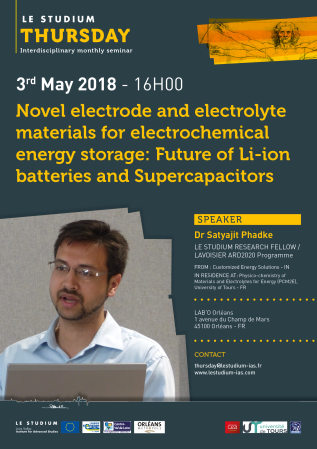Novel electrode and electrolyte materials for electrochemical energy storage: Future of Li-ion batteries and Supercapacitors
Lab'O Orléans
1 avenue du Champ de Mars
45100 Orléans
France
Presentation
We are already surrounded in our daily life by electrochemical energy storage devices powering all of our electronic devices while newer applications such as electric vehicles are rapidly gaining momentum. Additionally, the growing penetration of renewable generation sources such as wind and solar power has further necessitated the need of very large stationary energy storage for supplying continuous and reliable power. Such a growing demand has fuelled rapid development of new storage technologies with improved performance characteristics of cycle life, energy density, power density and energy efficiency.
This talk focuses on the fundamental relationship between the electrochemical properties of the active materials and the battery performance, which governs the research methodology. The dependence of the energy density on the charge storage capacity of the active materials has lead to the exploration of new materials with more enhanced physical properties. The upper limit on the operational longevity is a cumulative effect of microscopic degradation phenomena such as dissolution, mechanical stresses from volume changes and irreversible phase change, which are continuously at work during cell cycling. Additionally, the safety of the batteries is governed by the temperature sensitive parasitic chemical reactions and electrochemical decomposition of active materials at interfaces. A microscopic understanding of these underlying phenomena reveals new avenues for achieving the desired performance improvements in energy storage technology.
Speaker
LE STUDIUM RESEARCH FELLOW / Marie Skłodowska-Curie Research Fellow
Dr Satyajit Phadke
FROM : Customized Energy Solutions - IN
IN RESIDENCE AT: Physicochimie des Matériaux et Electrolytes pour l’énergie (PCM2E) - FR








